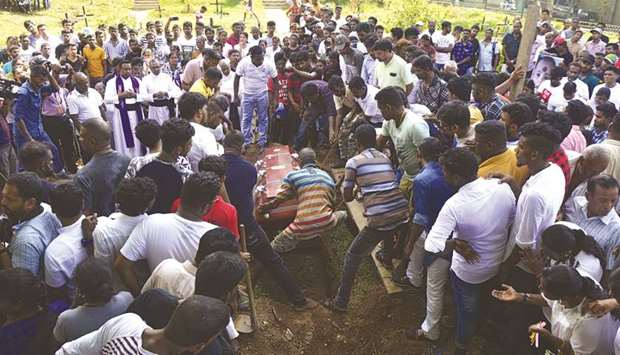Sri Lanka fell silent for three minutes yesterday on a day of national mourning to honour more than 300 people killed in suicide bomb blasts that have been blamed on a local group.
Flags were lowered to half-mast on government buildings, and people bowed their heads and reflected silently on the violence that has caused
international outrage.
The silence began at 8:30am (0300 GMT), the time that the first of six bombs detonated on Sunday morning, unleashing carnage at high-end hotels and churches packed with Easter worshippers.
Shortly after the silence was observed, a police spokesman said the death toll had risen to 310, with several people dying of their injuries overnight.
The first memorial services for the victims, among them dozens of foreigners, were being held yesterday, hours after the government imposed a state of emergency and said an Islamist group was behind the violence.
At St Anthony’s Shrine in Colombo - where scores died as they gathered for Easter Sunday prayers - a few dozen people held candles and prayed silently, palms pressed together.
And at St Sebastian’s Church in Negombo, north of the capital, an elderly man wept uncontrollably by the coffin bearing the body of his wife.
The attacks were also the worst ever against the country’s small Christian minority, who make up just 7% of the 21mn population.
Tensions remained high and security heavy after a bomb discovered by police on Monday near one of the targeted churches blew up before police could defuse it. Although there was a powerful blast, no injuries were reported.
Police also found 87 bomb detonators at a Colombo bus station.
More details have begun to emerge about some of the foreigners killed in the blasts.
The United States reported at least four Americans killed - including a child - and the Netherlands raised their toll to three.
A Danish billionaire lost three of his children in the attacks, a spokesman for his
company said.
Eight Britons, 10 Indians and nationals from Turkey, Australia, France, Japan and Portugal, were also killed, according to Sri Lankan officials and foreign
governments.
The UN said at least 45 children, Sri Lankans and foreigners, were among those killed.
The suicide bombers hit three Colombo luxury hotels popular with foreign tourists - the Cinnamon Grand, the Shangri-La and the Kingsbury - and three churches: two in the Colombo region and one in the eastern city of Batticaloa.
Two additional blasts were triggered as security forces carried out raids searching for
suspects.
Ethnic and religious violence has plagued Sri Lanka for decades, with a 37-year conflict with Tamil rebels followed by an upswing in recent years of clashes between the Buddhist majority and Muslims.
The attacks have sparked local and international outrage, and have been condemned by Sri Lankan Muslim groups.
Burials were expected to begin for some of the dead yesterday.
At St Sebastian’s, the atmosphere was heavy with grief as coffins were brought in the grounds one at a time for
services.
“There are so many bodies that we can’t accommodate them all at once,” Anthony Jayakody, auxiliary bishop of
Colombo, said.
The attacks have sparked local and international outrage, and have been condemned by Sri Lankan Muslim groups, with one urging the “maximum punishment for everyone involved in these dastardly acts”.

Relatives pour soil on the coffin of a bomb blast victim during a funeral in a cemetery in Colombo yesterday, two days after a series of bomb attacks targeting churches and luxury hotels in Sri Lanka.
